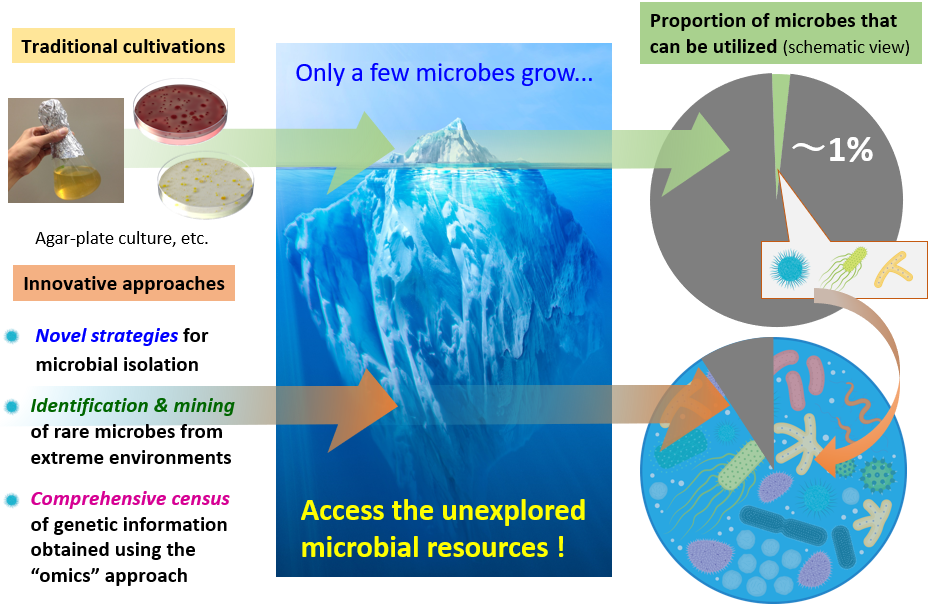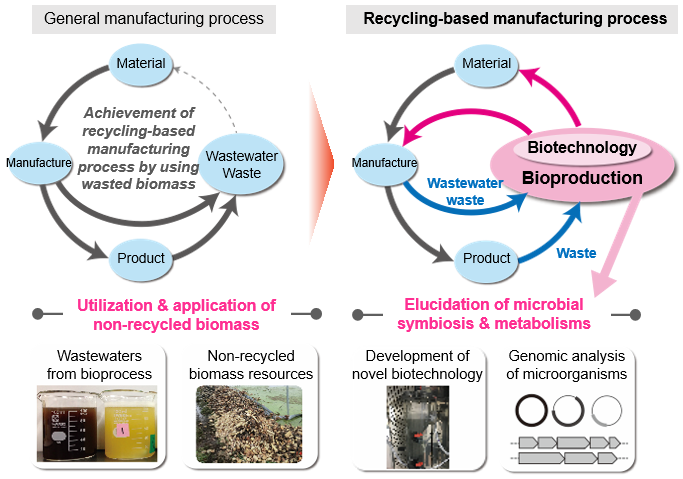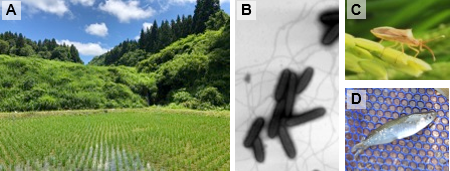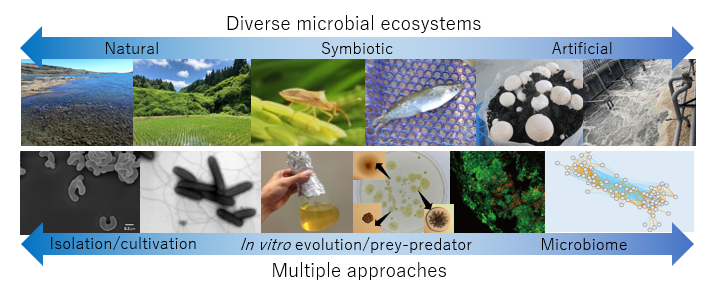

Exploration of interspecies interactions involving in novel microbial functions and adaptive evolutionary processes.
Microbes in the naturel settings coexist and interact with distinct microbial species in cooperative or competitive manners. Although it has been well recognized that such interspecies interactions were important as determinants of microbial behaviors in nature, variety of interactions and the relevant mechanisms remain largely unknown. We are analyzing the microbial behaviors (e.g. physiology, gene expression profiles, adaptive evolution) in mixed culture systems to elucidate effects and underlying mechanisms of various interspecies interactions and exploring novel microbial functions which are induced by the interactions. Especially, we are focusing on the interspecies interactions involving drug resistance of pathogen and community and evolutionary dynamics within prey-predator systems, trying to obtain fundamental knowledge for the development of novel therapeutic strategy and the deeper understanding of the nature of biological community.

Exploration and mining of rarely cultivated microorganisms in the environment
The advent of DNA sequencing technologies has greatly expanded our knowledge of microbial diversity and its significance. However, most microorganisms cannot be grown in the laboratory, even in this revolutionized sequencing era. We are trying to develop novel strategies to isolate rarely cultivated microorganisms to get an insight into this “microbial dark matter.” We are also focusing on unexplored, extreme environments, like deserts, hot springs, and polar habitats, to identify and study the novel microorganisms inhabiting them. We are probing the overlooked physiological and metabolic processes of these extremophiles, which may have the potential to aid the development of new concepts in biotechnology and innovative bioprocesses.

Development of novel biotechnology for sustainable society
Currently, wastewaters and wastes produced from general manufacturing processes are not effectively utilized, and most of wastes and wastewaters are treated by combustion, landfill, and land application, which cause several global issues (e.g. ground and water pollution, global warming, and depletion of natural resources). Until now, we have analyzed several microbial ecologies and functions in microbial wastewater treatment systems and agricultural systems. Using our core technologies, we are attempting to develop novel biotechnologies for sustainable recycling-based manufacturing process.

Expansion and application of ecology and functions of soil microorganisms
Soils harbor the largest number and variety of microorganisms on earth. Soil microorganisms are tiny and invisible, but they are essential members for the natural ecosystem and human society, supporting environmental homeostasis (e.g. carbon/nitrogen cycles) and plants growth. Such ecological functions of soil microorganisms become the foundation of the applied technology for environmental conservation and increased food production. However, most of the soil microorganisms are still unknown, leading to our “glimpse” of the ecological function of soil microorganisms. We aim to expand our understanding of the ecology and functions of soil microorganisms, by multifaceted viewpoints and methodological approaches, and to explore seeds for innovative technologies. The main research topics in recent years are as followings;
- Characterization and utilization of ubiquitous but previously-overlooked nitrogen fixation bacteria in paddy soils
- Elucidation and application of the hidden relationship between soils and insects for pest control.

Research targets: A, paddy field. B, soil microorganisms. C, rice bug. D, medaka.
Upgrading the industrial ecosystem by comprehensive understanding of biosphere ecosystem through microbiology informatics-based science
As mentioned above, we are promoting research projects funded by public institutions and private companies employing our knowledge regarding the 16S rRNA gene-based microbial community analysis and functional gene-based metagenomic analysis for a wide range of natural and artificial ecosystems: intestinal tracts of insects and fish, agricultural soil, paddy fields, desert, polar environments, terrestrial subsurface, plant roots, mixed culture systems, and municipal sewage/industrial wastewater treatment processes. We aim to improve the industrial ecosystem for upcoming sustainable circular economy by comprehensive understanding of the biosphere ecosystem through microbiology informatics.



























